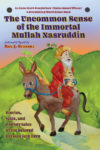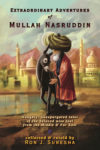- Full Cover Reveal of The Un… by rjs

Bear Bones Books is pleased to announce the pending release of the redesigned edition of The Uncommon Sense of the Immortal Mullah Nasruddin: Stories, jests, and donkey tales of the beloved Persian folk hero, collected & retold by Ron J. Suresha.
- “Ridiculously funny” by rjs

“The author’s roundup is exhaustive, perhaps one of the most honest of all English collections that have been published as popular Mullah Nasruddin literature.”
- Exchange rate by rjs

Nasreddin Hoca ordered a new shirt from Hussein the tailor, and when it was ready, he went to the tailor’s shop to pick it up.

100+ Favourite Tales of Naseddin Hoca After Nasreddin paid for the shirt, he decided to shop for some new pants. He chose a nice pair of baggy pants and tried them on, and the two bargained and agreed on a price.
- New collection of Nasruddin… by rjs

Bear Bones Books announces the publication of a new collection of the most popular Nasreddin Hoca folk tales and jokes, in multiple formats on several platforms available everywhere. 100+ Favourite Tales of Nasreddin Hoca Favourite Tales of Nasreddin Hoca Favorite Stories of Mullah Nasruddin Treasured, oft-told stories of the famous funny folk hero by Ron[…]
- The pile in the vineyard by rjs

Young Nasruddin was passing a vineyard and was very thirsty, so he jumped the fence and began to pull down and gobble the luscious grapes. But Bekri, the owner, spotted him and yelled…
- Middle of the mat by rjs

The three men bought the mat and the other two bought the blanket.
Nasruddin stretched out in the center of the mat and promptly fell asleep. - Mullah Nasruddin books both… by rjs

Both of Ron J. Suresha’s acclaimed Mullah Nasruddin story collections are now available in hardcover!
- Nasruddin – ahora en español by rjs
Estas dos aclamadas colecciones de historias de Nasruddin ahora están disponibles en español. Both acclaimed collections of Nasruddin stories are now available in Spanish from Bear Bones Books / Babelcube. ~ El sentido poco común del inmortal mulá Nasrudín Historias, bromas y cuentos de burros del querido héroe popular persa por Ron J. Suresha Traducido[…]
- 100+ Favourite Tales of Nas… by rjs

100+ Favourite Tales of Nasreddin Hoca: Treasured, oft-told stories of the famous funny folk hero Collected and retold by Ron J. Suresha Published by Bear Bones Books. ~Now available from Barnes & Noble! Get the softcover edition here. Get the digital edition here. ~Nasreddin Hoca, the eight-centuries-old “wise fool” character originating from Turkey and the[…]
- Revised edition of *Extraor… by rjs
Announcing the new Revised Edition of the acclaimed authentic story collection! Extraordinary Adventures of Mullah Nasruddin Order the book now from Amazon here. Order the ebook from Amazon Kindle here. HONORS ~ Lambda Literary Awards, Finalist ~ Rainbow Book Awards, Honorable Mention ~ This acclaimed folklore collection details the escapades and exploits of the beloved 800-year-old[…]
- From the book Uncommon Sense ( 156)Recent Posts
- Full Cover Reveal of The Un… by rjs
- Mullah Nasruddin books both… by rjs
- New edition of *Uncommon Se… by rjs
- Listen. Laugh. Repeat. Mull… by rjs
- Short-term commitment by rjs
- The Daily Nasruddin ( 111)Recent Posts
- Exchange rate by rjs
- The pile in the vineyard by rjs
- Middle of the mat by rjs
- Big fish, little fish by rjs
- The power of chalk by rjs
- From the book Extraordinary Adventures ( 70)Recent Posts
- “Ridiculously funny” by rjs
- The pile in the vineyard by rjs
- Middle of the mat by rjs
- Mullah Nasruddin books both… by rjs
- Revised edition of *Extraor… by rjs
- Announcements ( 45)Recent Posts
- Full Cover Reveal of The Un… by rjs
- New collection of Nasruddin… by rjs
- Mullah Nasruddin books both… by rjs
- Nasruddin – ahora en español by rjs
- 100+ Favourite Tales of Nas… by rjs
- Reviews ( 11)Recent Posts
- “Ridiculously funny” by rjs
- Review of Extraordinary Adv… by rjs
- Storytelling World Magazine… by rjs
- Immortal Mullah Nasruddin w… by rjs
- Green Man Review of Immorta… by rjs
- Media ( 9)Recent Posts
- New collection of Nasruddin… by rjs
- Mullah Nasruddin books both… by rjs
- 100+ Favourite Tales of Nas… by rjs
- Review of Extraordinary Adv… by rjs
- Extraordinary Adventures Na… by rjs
- Mullah Nasruddin art ( 3)Recent Posts
- From the book 100+ Favourite Tales ( 1)Recent Posts
- Exchange rate by rjs
- Mullah Audiobooks ( 1)Recent Posts
- “Ridiculously funny” by rjs
- [...]
- No comments yet.

First and Last Payment
First and Last Payment
Excerpted from The Uncommon Sense of the Immortal Mullah Nasruddin: Stories, Jests, and Donkey Tales of the Beloved Persian Folk Hero
Your Daily Nasruddin
Justice and fairness are recurring themes in Nasruddin stories. There is often in such tales a distinct sense of comeuppance, where the antagonist — be he a liar, thief, crook, schnook, or intellectual snob — is put in his rightful (inferior) place by our hero.
The Mullah is, on several occasions in different stories, treated shabbily for wearing shabby clothes. We Nasruddin lovers know our hero’s (immeasurable) true worth, but his apparent poverty leads him into several situations where he is shunned then returns to reveal his true value (as a customer, to the religious and civic community, etc).
“Last time counted for this time; and this time counts for last” is a switcheroo that rebukes and reproves the greedy hamamjis, who are more concerned with counting their tips than with providing good service to everyone, every time. Of course, the implication is that if they provided consistently good service, they would get always receive a generous tip.